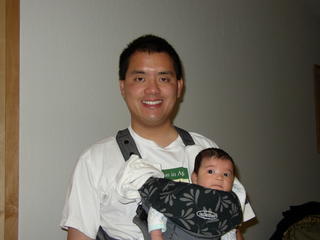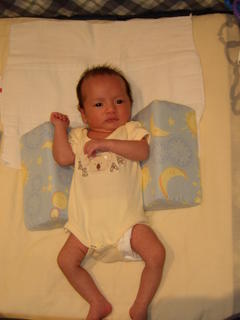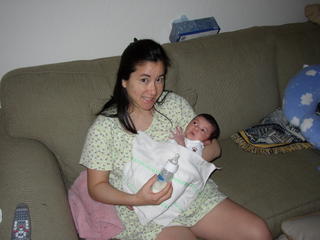 Yesterday was officially the one month old birthday of Katherine and Caroline. We celebrated with "Red Eggs & Ginger."
Yesterday was officially the one month old birthday of Katherine and Caroline. We celebrated with "Red Eggs & Ginger."
Red Eggs and ginger is a traditional Chinese celebration at the baby's first month birthday.
David's Mom boiled and dyed some eggs. The grandparent's also gave "lysee", the money in red envelopes, to the girls as a birthday gift.
We didn't have any ginger because no one in our family likes eating plain ginger!
Tradition also says that the baby's heads should be shaved completely for good luck. No doubt this was because in the old days, hair was a good way to contract lice, or other nasty diseases.
Like the ginger, there was no head shaving of Katherine and Caroline. We did, however, get some good photos, and a pretty good egg-salad for lunch!

Grandpa & Grandma giving "lucky money".
******************************
Here's a good, brief history of the Red Egg & Ginger Tradition:
In Chinese culture, a baby's first month birthday calls for a celebration. Proud parents introduce their latest addition to friends and relatives by holding a red egg and ginger party. Traditionally, the baby's name is also announced at this time.
Guests attending red egg and ginger parties bring gifts. Lysee or "lucky money" in red envelopes is often given to baby boys, while girls may receive expensive jewelry. The guests don't leave empty handed, either. The parents hand out red-dyed eggs, symbolizing happiness and the renewal of life.
Red egg and ginger parties have their origins in ancient Chinese culture. As in other countries, infant mortality rates in China were quite high prior to the medical advances of the twentieth century. A baby who reached one month of age was likely to survive, and so the event was celebrated.
Traditionally, this was also a time to reintroduce the mother to the world. The Chinese believe mothers are in a highly weakened state in the period immediately following birth. Just as English custom calls for new mothers to enjoy a brief period of confinement, Chinese mothers have traditionally been expected to rest indoors for one full month after giving birth. This helped ensure they didn't become overtired, or contract any germs or illnesses from the outside world that could prove dangerous in their weakened state. Besides resting, they drank a nutritious broth made with pig's feet, eggs, vinegar and ginger. Many new mothers still follow this ritual today.
In the past, due to the traditional importance of male children in Chinese culture, red egg and ginger parties were sometimes given for boys only, or the celebration for boys was more elaborate. Today, parties are given for babies of both sexes.
In recent years, some of the traditions surrounding red egg and ginger parties have been modified. Parents may choose to hold the celebration at a fancy restaurant, complete with costumed Chinese performers or even a children's magician. Also, the baby may be anywhere from one to three months old by the time the party is held. But the custom of passing out red-dyed eggs continues. Parents may also use the brightly colored eggs to announce the birth; an even number of eggs are sent out for a boy, and an odd number to announce a baby girl.
From: About.com
******************************
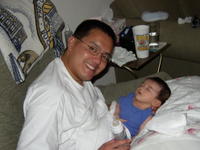
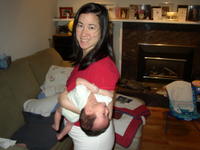 Terri & Caroline (in her favorite napping position) - Week 7
Terri & Caroline (in her favorite napping position) - Week 7








